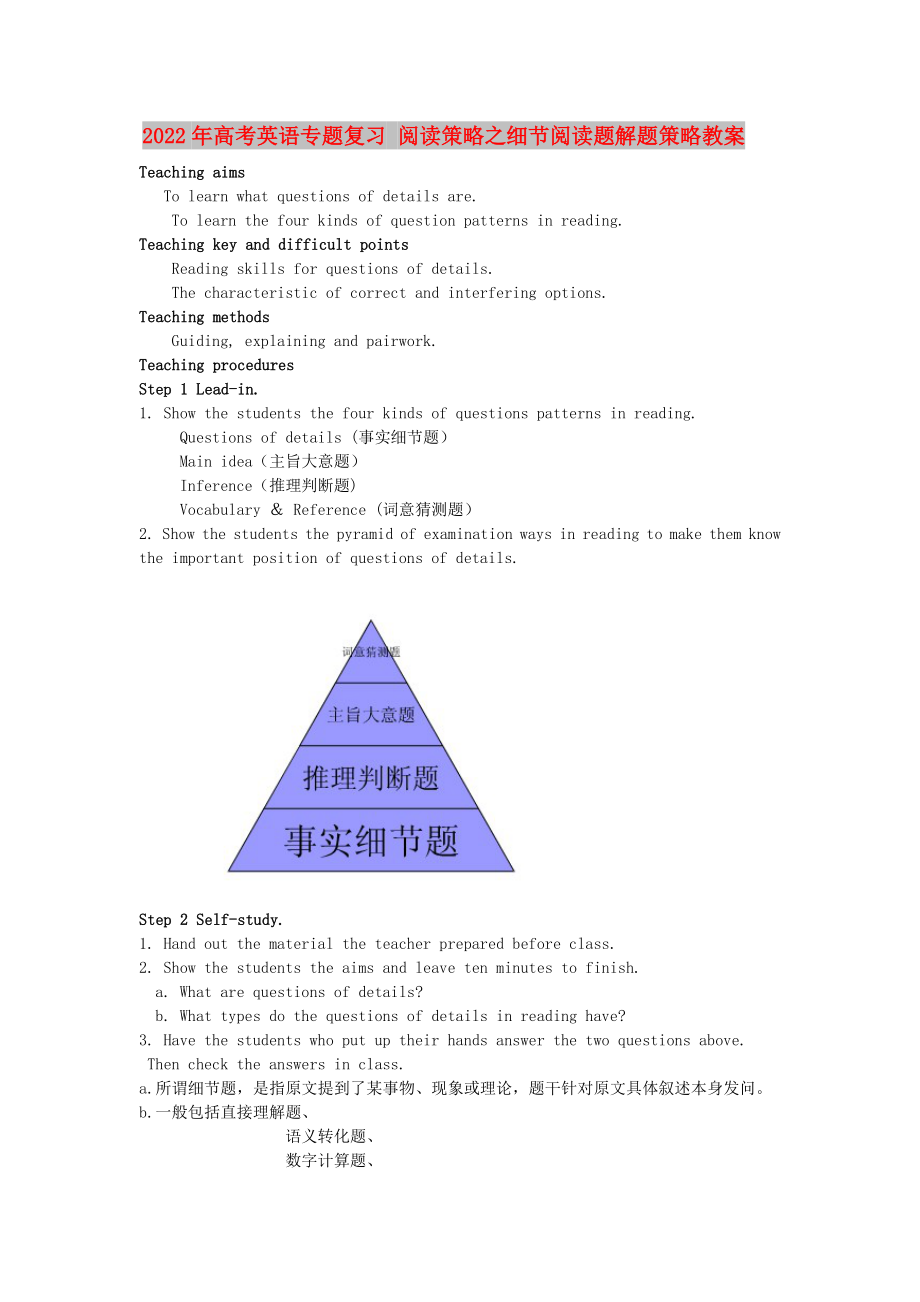《2022年高考英語(yǔ)專(zhuān)題復(fù)習(xí) 閱讀策略之細(xì)節(jié)閱讀題解題策略教案》由會(huì)員分享,可在線閱讀���,更多相關(guān)《2022年高考英語(yǔ)專(zhuān)題復(fù)習(xí) 閱讀策略之細(xì)節(jié)閱讀題解題策略教案(3頁(yè)珍藏版)》請(qǐng)?jiān)谘b配圖網(wǎng)上搜索����。
1���、2022年高考英語(yǔ)專(zhuān)題復(fù)習(xí) 閱讀策略之細(xì)節(jié)閱讀題解題策略教案
Teaching aims
To learn what questions of details are.
To learn the four kinds of question patterns in reading.
Teaching key and difficult points
Reading skills for questions of details.
The characteristic of correct and interfering options.
Teachi
2��、ng methods
Guiding, explaining and pairwork.
Teaching procedures
Step 1 Lead-in.
1. Show the students the four kinds of questions patterns in reading.
Questions of details (事實(shí)細(xì)節(jié)題)
Main idea(主旨大意題)
Inference(推理判斷題)
Vocabulary & Reference (詞意猜測(cè)題)
2. Show the students t
3����、he pyramid of examination ways in reading to make them know the important position of questions of details.
Step 2 Self-study.
1. Hand out the material the teacher prepared before class.
2. Show the students the aims and leave ten minutes to finish.
a. What are questions of details?
b. Wh
4���、at types do the questions of details in reading have?
3. Have the students who put up their hands answer the two questions above.
Then check the answers in class.
a.所謂細(xì)節(jié)題�,是指原文提到了某事物���、現(xiàn)象或理論�����,題干針對(duì)原文具體敘述本身發(fā)問(wèn)����。
b.一般包括直接理解題�、
語(yǔ)義轉(zhuǎn)化題、
數(shù)字計(jì)算題�����、
排列順序題��、
5���、
圖表圖畫(huà)題等����。
Step 3 Cooperative study.
1. Show the students a question on the screen and have them work in groups.
How to recognize the questions of details in reading?
2. Feedback.
Types: 是非題
年代與數(shù)字考點(diǎn)
Wh-題
是非題的提問(wèn)方式:
三誤一正:
Which of the fo
6���、llowing statements is true?
三正一誤:
Which of the following is not true?
Which of the following is not mentioned?
Which of the following is true except…?
Which of the following (statements) is
mentioned except …?
Step 4. Explaining the key points
The teacher will exp
7���、lain some key points.
a. Reading skills for questions of details.
b. Characteristic of correct options.
1���、 對(duì)原文句子中的關(guān)鍵詞進(jìn)行替換。
2�����、詞性或者語(yǔ)態(tài)的變化�。
3、 語(yǔ)言簡(jiǎn)化��。
4�、正話反說(shuō)。
c. Characteristic of interfering options.
1����、將原文內(nèi)容擴(kuò)大或縮小。
2�、把未然當(dāng)已然。
3�����、無(wú)中生有�。
4、偷換概念�。
5�����、文不對(duì)題����。
Step 5. Consolidation and improvement.
Ask
8�����、 the students to turn to Page 4.
Read the passage of LEONARDO DA VINCI and finish the exercises on Page 8.
1.Da Vinci was all the below except___________.
A. a painter B. a mathematician
C. a philosopher D. a pianist
2. Which of the following descriptions about Leonardo da Vinci
9���、 is correct?
A. Da Vinci is best known for the 'Mona Lisa', which is kept in a museum in France.
B. Da Vinci had many half brothers and sisters because their parents were not married.
C. Da Vinci was an inventor with ideas ahead of his time, so his inventions such as planes and parachutes were ve
10、ry popular.
D. Da Vinci suffered from aralysis of the hand in later life and had to give up drawing pictures.
3. Why did da Vinci leave many works unfinished?
A. Because he was not only a great artist, but also an inventor, scientist, mathematician and philosopher.
B. Because he had such a wide
11��、 range of interest , his attention often changed from subject to subject.
C. Because he wanted to give people more space to imagine what grand pieces the finished ones would be.
D. Because he died very young and did not have the time to do all the work.
Check the answers together.
Make a brief summary about the class.
 2022年高考英語(yǔ)專(zhuān)題復(fù)習(xí) 閱讀策略之細(xì)節(jié)閱讀題解題策略教案
2022年高考英語(yǔ)專(zhuān)題復(fù)習(xí) 閱讀策略之細(xì)節(jié)閱讀題解題策略教案

